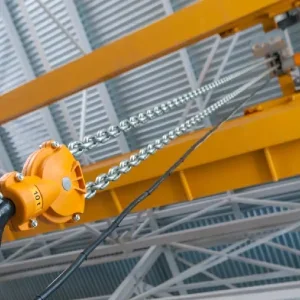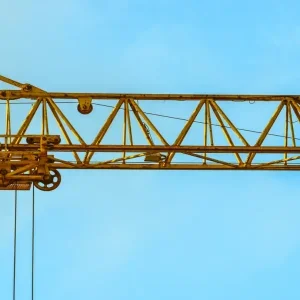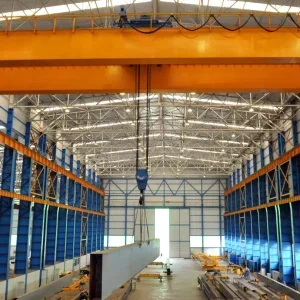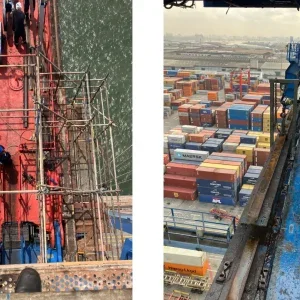Ever since the US company Morris Material Handling Inc decided last year that it wanted to shed its overseas operations, the future of these business was uncertain. Morris Inc was – and still is – in Chapter 11 bankruptcy protection. Its recovery strategy centred on becoming a smaller business focused on domestic operations.
The announcement on 7 March that UK, Singapore and Thailand operations were being bought by the UK management team has brought to end, at least for the foreseeable future, that uncertainty. It also brings to an end the seven year international adventure of the US company.
It was in October 1994 that P&H Harnischfeger of Oak Creek, Wisconsin bought Morris Mechanical Handling Limited for $25m. Morris was a UK company with subsidiaries overseas. At that time it had annual sales of about $90m and about 750 employees, two thirds of whom were based at the Loughborough factory and head office in central England.
By April 1998 Harnischfeger was in financial trouble and that month sold 80% of its P&H materials handling business to an investment group called Chartwell. With the P&H name belonging to Harnischfeger still, the company needed a new name and decided to consolidate under the name of Morris Material Handling. The well-known P&H name was retained, with permission, as a product brand in North American markets.
That year sales fell 10%. The subsequent years proved difficult and the debt burden inherited by Chartwell did not help. On 1 January 1999 debt stood at $277m and in the three months to 30 April 1999 sales fell 12% to $71.8m and the company made a net loss of $12.9m. Newly appointed chief executive Jack Stinnett talked up the company’s prospects, however, pointing to a string of orders in the UK.
The financial year ending 31 October 1999 saw the company make a net loss of $98m on sales down 7% to $294m. Defaulting on its banking agreements, Morris engaged Donaldson, Lufkin & Jenrette Securities to review is options. In May 2000 it opted for Chapter 11 protection for its US operations.
During the second half of 2000 potential bidders for some or all the non-US businesses hovered around. Groupe Fayat of France, the parent company of crane and hoist manufacturer ADC, looked like the front-runner at one stage. Mike Maddock, managing director of the UK operation, takes up the story. “Once the Fayat deal seemed not to be closing – and we’ll never know why – we began to start thinking about a management buyout. The Americans told us that they would be interested in receiving a management bid but it would still be an open competition.
The four managers that put the bid together were Mike Maddock himself, finance director Steve Davis, operations director Bill Oliver, and commercial manager Andy Miller. They were backed by a loan from GE Capital. They do not want to reveal what the purchase price was; nor will they disclose what shareholding each has.
The management buyout (MBO) team was only interested in the factory crane and hoist parts of the business. It chose not to take the dockside crane business or the factory automation business, because both of these involved large contracts requiring large bonds. Morris had actually already effectively pulled out of the ports business, not bidding for projects for the past couple of years. The strength of the British currency of the growth of the Chinese manufacturers had made life too hard for Morris in the dockside crane business.
The MBO team also did not want the operations in South Africa or Australia, which have therefore remained with Morris Inc of the USA, for the time being at least. The South Africa business has sales of about $4.5m and Australia $10m (US$). But Maddock says his team only wanted satellite operations that take product from the UK hoist factory. Singapore and Thailand were also more attractive than South Africa and Australia, Maddock says, because they are ‘regional players’, and not confined to their own country.
The other key asset that the new owners have not bought is the property. That is being sold separately by the Americans to a property company. The factory and office block in Loughborough stand on a large site, much of it no longer used. With a new road to be built by the local council across part of the land, the site is ripe for redevelopment. Morris Ltd has a renewable 15 year lease on the buildings it uses. Asset stripping by new or future owners is no longer an option.
It is safe to presume that excluding the property from the MBO deal reduced the purchase price, but Maddock is not prepared to discuss such details. He says only: “We are not in the property business. We are in the business of making money out of materials handling.” The new company that Maddock and his colleagues have bought expects sales of £25m this year. And they expect it to be profitable, Maddock says.
Given that the Loughborough managers have bought what is basically the unwanted arm of a company losing $100m a year, how can they be so optimistic? “We are investing in a changing company. The new company is in good shape,” Maddock asserts. Things were helped by putting the old business into receivership for a few hours before the MBO deal was completed. This allows the new owners to start out with no debt or liabilities. Creditors now have to pursue the receivers if they want their money back. Many of the creditors are long-standing suppliers who have served Morris well over the years. Some are understanding, and say that they will accept the hit to their finances and now look forward to doing business with the new Morris. Others are are rather more angry about how they have been treated. Maddock says that it was necessary to wind up the old company and start again because the MBO was not bidding for the whole company, but only for certain assets.
“Of course it is not a great way to start a new business,” he says, in reference to the aggrieved creditors. “It is not something we wanted to do, but that’s the way it ended.” Besides, it was the American bankers controlling Morris Inc during its Chapter 11 residency that actually put Morris Ltd into receivership and not the UK managers, he says.
Maddock explains the new company’s basic strategy: “Our bread and butter business will be the standard crane business, produced from standard designs with standard hoists. But we will have the engineering expertise to produce engineered cranes. The base business will be high volume and we will attempt to modularise our engineered cranes so that they are competitively priced.” The business has already been streamlined after a series of redundancies in recent years. There are now about 360 employees – 200 in Loughborough, 100 in service depots around the UK and 60 in the Singapore and Thailand crane and hoist assembly operations. Morris Ltd is effectively a crane builder in the UK, Singapore, Thailand and (through joint venture partners) the Middle East, and a hoist supplier in other markets.
Not only is the business now the right size, says Maddock, but with the S3 chain hoist it has the right product. He says that the S3 has made a big difference to the business as it enables Morris to compete on price. “It gives customers all the features of a modern hoist as standard,” he adds.
According to operations director Bill Oliver (part owner and still in his mid 30s), production of the S3 is running at about 9,000 units a year. The Loughborough factory produces many more chain hoists than wire rope hoists, though in terms of turnover and man-hours, the split is about 50:50, Oliver says.
A European version of the M Series wire rope hoist is also about to be launched to replace the 400 Series. The M Series was developed in conjunction with Morris Inc in the USA before the separation of the two companies. Morris Ltd continues to supply such components as the drum.
Future opportunities have also been identified. “There are some niches we believe we should be targeting. Europe has to be a target, selling hoists and crane kits.” Morris already sells S3 hoists to Munck and Yale in continental Europe which badge them as their own. In fact more than half the S3 units built go to these two companies. Maddock is aware of the need to preserve existing deals if he sets up new ones. “We would have to be very careful how we did it,” he admits. “We are not about to upset relationships that we have built up over the years. But there are more routes to market in Europe that have not been exploited.” The Yale relationship may offer a template. Yale even sells the S3, badged as a Yale product, in competition with Morris in the UK. “We would rather have that than have them form a relationship with someone else,” Maddock says. “I have been with Morris for 12 years and the Yale relationship goes back longer that that. I think those sort of relationships are ones that Morris has to develop all around the world.” “I can’t recall being as excited about the opportunities for the company as I am now,” says Maddock. “The reason for that is that the company is exactly the right shape for the tasks ahead.”






